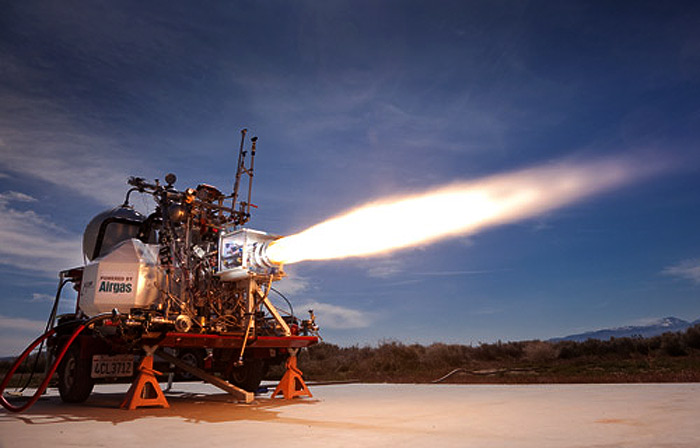.

Rocket Engines Overview
XCOR develops rocket-propelled vehicles, rocket propulsion systems, and propulsion components to customer order. We have developed technologies in a number of subsystems that further the goal of operationally effective, reliable, low maintenance rocket propulsion systems. These systems are designed to maximize safety and minimize cost. Since our rocket vehicles use our own rocket engines and systems, we have unique insight into the system-level tradeoffs needed for operationally responsive rocket propulsion. We have developed the kind of rocket propulsion that real systems can use.
Our team’s experience is current, and since inception we have become a leader in the development of dependable, low-cost rocket engines. We have developed a series of proprietary engines and igniters, and have built, tested, and flown the EZ-Rocket twenty-six times and the X-Racer 40 times. To date, we have continued the technological development of rocket engines, building and enhancing many designs from 15 lb thrust up to 7,500 lbf. XCOR’s engines burn a variety of non-toxic fuels, including kerosene, hydrogen, methane, ethane, propane, alcohol and kerosene using oxidizers such as liquid oxygen and nitrous oxide.
.
Press Release
XCOR Aerospace Announces Latest Milestone in ULA Program
Mojave, CA, November 20, 2014 – XCOR Aerospace today announced it has completed the latest test series for the liquid hydrogen engine it is developing for United Launch Alliance (ULA). This is an important milestone in the long-running LH2 (liquid oxygen and liquid hydrogen) program. It is also a step toward running the engine in a fully closed cycle mode.
In its most recent milestone, XCOR successfully performed hot fire testing of the XR-5H25 engine’s regeneratively cooled thrust chamber, with both liquid oxygen and liquid hydrogen propellants supplied in pump-fed mode, using XCOR's proprietary piston pump technology.
“This test marks the first time liquid hydrogen and liquid oxygen have been supplied to a rocket engine with a piston pump,” says XCOR Chief Executive Officer Jeff Greason. “It is also the first time an American LH2 engine of this size has successfully fired liquid hydrogen and liquid oxygen together in pump-fed mode. We are happy to be making solid progress on the engines. This will also bring us to a new phase in our plans for orbital flight.”
"ULA has an ongoing effort to develop rocket engines for our next generation upper stage, and we are thrilled to see that progress continuing with XCOR," added ULA Vice President George Sowers.
Upcoming test series will fully integrate the nozzle with the engine and piston pumps. Fully closed cycle testing will follow soon afterwards and will complete the sub-scale demonstration engine program.
The XR-5H25 engines are being developed under contract to ULA as potential successors to the Delta and Atlas series upper stage engines currently used. These engines will also help power orbital launches.
Quelle: XCOR
4931 Views
